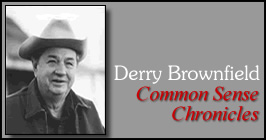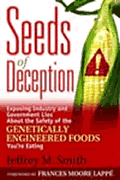Other
Brownfield
Articles:
Fear Not-The
Odds Are on
Your Side
Derry Brownfield
November 29, 2003
NewsWithViews.com
Tom Graham once wrote a song titled: "Them Danged Ole Cows." The Song explains that a rancher's part in the economy is to borrow lots of money. I've been a cattleman for most of my life and I have done more than my part towards helping the economy by borrowing money. I did most of my borrowing in the 1960's and 70's when interest was at 5 and 6 percent, and I didn't have it paid back when interest hit 20% in the 1980's. My signature was on the largest note ever written at our local bank and as a result I gained a seat on the bank's board of directors. I never really understood the banking business, but I do know that when your out-go exceeds your income, your up-keep becomes your downfall. At one time I had money borrowed from 2 different banks, the Production Credit Association, the Federal Land Bank and the Church of the Nazarene. Yep! I was doing my part in supporting the economy. I learned a great deal about our debt money system, so when low interest rates and these mortgages-dot-com companies began coming on line I never understood how they could do what they claimed they were doing and survive. No money down, no points, and a loan up to over 100% of the appraised value. It looked to me like a road map for disaster.
Chuck Cross, acting director of consumer services, shares some of my concerns. An article appearing in the Seattle Times discusses Capitol Commerce Mortages (CCM). CCM is based in Sacramento, California and buys and sells loans on a national scale. In my money borrowing days I always dealt with a local bank or a local office. I knew the people I was dealing with and could walk into their office (the sweat box) and discuss my problems on a face-to-face basis. Today, most homeowners have no idea who holds the paper on their property. It could be a company a thousand miles away or even in another country. Our federal government sells paper to foreign countries and according to CNBC more than 43% of our $1.3 trillion foreign debt is held by Red China and Japan. If these countries buy our government bonds, is there any reason they won't buy our home mortgages? The Seattle Times says that CCM has abruptly closed its door, and have advised people that they are unable to fund their loans.
Here's the way it works. Wholesalers buy the loans from the local bank and resell them to investors. When interest was down in the 4 and 5 percent range, homeowners rushed to refinance at the lower rates. Many of these mortgage brokers signed a locked-in rate agreement with the borrower only to find that interest rates had increased before the mortgage was resold. If the mortgage company doesn't have capital assets to make up the difference, they cannot fund the loan. At least two lenders operating in Washington State have been unable to honor loan commitments. One mortgage company attracted homeowners with offers of low interest mortgages with no closing costs. Then sent letters to would-be borrowers saying they would not be able to obtain financing before their locked-in period expired. If this is happening in Washington there is a good chance it is also occurring where you live.
Now the trickle down effect comes into play. Not only is the buyer of the home without financing but the seller is also caught in the scheme of things. If you figure the percentages and run the numbers through your handy-dandy-made-in-China calculator, you'll see that interest has gone up around 25 % in a little over one month's time... That makes the price of a home over a 30-year period increase as much as 15%. On a 30-year mortgage the homeowner pays more interest than principle. A family with an annual income of $100,000 making a down payment of 20 %, with interest at 5% can afford a home of over $450,000. If interest goes to 9% the same buyer can barely pay for a house costing $300,000. Each time interest increases 1%, the homeowner needs about 10% more income to afford the same house. Over the period of a 30-year mortgage the banker gets more in interest than the seller of the house received at the time of purchase.
Is it possible that the housing market could become the next Enron?
� 2003 Derry Brownfield - All Rights Reserved
Sign
Up For Free E-Mail Alerts
Derry Brownfield was born in 1932 and grew up during the depression. He is a farmer and a broadcaster. Derry attended the College of Agriculture at the University of Missouri where he received his B.S. and M.S. degrees. He taught Vocational Agriculture several years before going to work as a Marketing Specialist with the Missouri Department of Agriculture. Derry served as Director of the Kansas City Livestock Market Foundation at the Kansas City Stockyard prior to establishing himself in farm broadcasting.
Derry started farming when he was 16 years old and received the Future Farmers of America State Farmer degree in 1949. Since that time the Brownfield Farm has grown to over 1000 acres maintaining a herd of 200 registered Charolias cows.
In 1972, Derry and his partner established the Brownfield Network which now serves 250 radio stations throughout the Midwest with news and market information. In 1994, Derry started his own syndicated radio talk show and he is one of the most popular radio talk show hosts in America. The Derry Brownfield Show can be heard on approximately 80 radio stations in 23 states. With his entertaining sense of humor and witty commentary he has captured audiences for over 30 years. His ability to present an informative talk show while being light and colorful is why he has a large loyal listening audience.
Derry Brownfield is a practical farmer, a practical
business man and a very entertaining speaker. He travels extensively throughout
the country speaking about his common-sense point of view. Web Site: www.derrybrownfield.com
"Our federal government sells paper to foreign countries and according to CNBC more than 43% of our $1.3 trillion foreign debt is held by Red China and Japan.
If these countries buy our government bonds, is there any reason they won't buy our home mortgages? The Seattle Times says that CCM has abruptly closed its door, and have advised people that they are unable to fund their loans."




